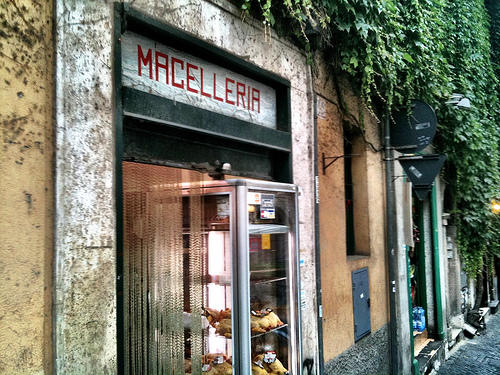Shopping - Lesson 3 - Conversation:
Alla macelleria
(At the butcher shop)
(photo
by Brad Coy used
under terms of Creative Commons license.)

|
Macellaio: |
Buon giorno, Signora. In che posso servirLa? |
|
Signora Smith: |
Vorrei mezzo chilo di tritato ed un arrosto di
vitello da circa due chili. |
|
Macellaio: |
Ecco qui. Desidera altro? |
|
Signora Smith: |
Si, tre bistecche di costata spesse due dita,
delle salsicce. |
|
Macellaio: |
Una dozzina? |
|
Signora Smith: |
Si, grazie. Mi dia anche mezzo chilo di fettine di
vitello, sottili, per favore. |
|
Macellaio: |
Va bene così, Signora? |
|
Signora Smith: |
Si. Quant'é? |
|
Macellaio: |
35.500 lire. |
|
Signora Smith: |
Scusi, ha un pollo arrosto? |
|
Macellaio: |
No, Signora, mi dispiace. Deve andare alla
rosticceria qui di fronte. |
|
Signora Smith: |
Grazie mille. |
|
Macellaio: |
Non c'e di che. |
Translation:
|
Butcher: |
Good morning, ma'am. May I help
you? |
|
Mrs. Smith: |
I'd like half a kilo of ground
beef and a veal roast of about two kilos. |
|
Butcher: |
Here. Do you want anything else? |
|
Mrs. Smith: |
Yes, three T-bone steaks, two
fingers thick, and some sausages. |
|
Butcher: |
A dozen? |
|
Mrs. Smith: |
Yes, thank you. Also give me
half a kilo of sliced veal, thin, please. |
|
Butcher: |
Is it OK like that, ma'am? |
|
Mrs. Smith: |
Yes. How much is it? |
|
Butcher: |
35,500 lire. |
|
Mrs. Smith: |
Excuse me, do you have a roast
chicken? |
|
Butcher: |
No, ma'am, I'm sorry. You must
go to the rotisserie across the street. |
|
Mrs. Smith: |
Many thanks. |
|
Butcher: |
Don't mention it. |
Notes on conversation
1. Carne tritata or tritato means "ground beef."
2. Spesso, "thick," is used to order a cut of meat. To indicate the thickness they desire, Italians say spessa un dito, spessa due dita, while showing one or two fingers. Il dito (masculine singular) is "the finger" and le dita (feminine plural) means "the fingers."
3. sottile, "thin."
4. Rosticceria "rotisserie." A very useful place to buy everything from a quick lunch to a full (carry-out) dinner. It is similar to an American delicatessen or snack bar. These shops are open on Sundays and holidays and often carry items found in the generi alimentari.
5. Di fronte, "in front of, opposite, facing or across the street." Di faccia has the same meaning.
6. Usually